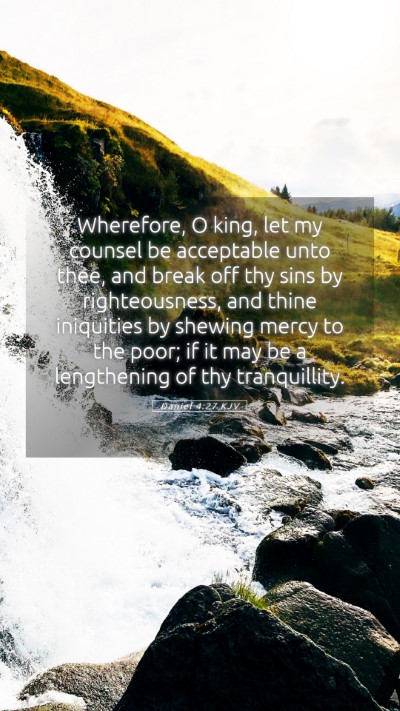Bible Verse Commentary on Daniel 4:27
Verse: Daniel 4:27 - "Wherefore, O king, let my counsel be acceptable unto thee, and break off thy sins by righteousness, and thine iniquities by shewing mercy to the poor; if it may be a lengthening of thy tranquillity."
This verse is part of a significant passage where Daniel interprets King Nebuchadnezzar's troubling dream, which foretells his impending downfall due to pride and arrogance. The admonition delivered by Daniel carries profound Bible verse meanings that resonate in the broader context of scripture.
Meaning of the Verse
Daniel's counsel to King Nebuchadnezzar highlights several key themes:
- Grace and Repentance: Daniel implores the king to change his ways, emphasizing that true repentance can lead to divine mercy.
- Righteous Living: The call to 'break off thy sins by righteousness' underscores the importance of living justly and fairly, reflecting God's justice.
- Compassion: Showing mercy, particularly to the poor, is a vital aspect of true repentance and demonstrates a heart aligned with God’s will.
- Consequences of Sin: The verse asserts that continued pride and sin could lead to judgment, while turning to righteousness may extend peace and tranquility.
Commentary Insights
Matthew Henry
Matthew Henry emphasizes the importance of Daniel's message, noting that he does not simply predict the king's fate but advises him on how to avoid disaster. He interprets the king's behavior as a reflection of human pride that often leads to downfall and emphasizes that turning to righteousness is crucial for salvation.
Albert Barnes
Albert Barnes highlights the compassionate nature of Daniel's advice, illustrating how despite the king’s oppressive actions, Daniel seeks his welfare. Barnes notes the practical outworking of true repentance—showing mercy is essential. This suggests that the king’s reformation must be genuine and visible in his actions towards the poor and oppressed.
Adam Clarke
Adam Clarke elaborates on the significance of the king acknowledging his iniquities and the societal responsibilities he bears. Clarke comments that the absence of humility and caring for others leads to societal instability and personal unrest.
Application for Today
The lesson from Daniel 4:27 remains relevant for modern audiences. It presents a clear bible verse interpretation regarding the fruits of repentance and acts of mercy. The importance of righteousness and compassion acts not only as a divine guideline but also as a pathway to greater peace and stability in any community or personal life.
Practical Bible Study Insights
For those engaging in the Bible study resources, several tools and methods can enhance understanding:
- Group Discussions: Engaging in bible study groups can foster deeper understanding of individual verses and how they relate to personal experiences.
- Historical Context: Researching the background of the Babylonian Empire and the nature of Nebuchadnezzar's reign can provide valuable scripture analysis.
- Comparative Studies: Examining similar themes in other books of the Bible can enrich one’s bible verse understanding.
Related Bible Cross References
- Proverbs 21:13 - "Whoso stoppeth his ears at the cry of the poor, he also shall cry himself, but shall not be heard."
- Isaiah 1:17 - "Learn to do well; seek judgment, relieve the oppressed, judge the fatherless, plead for the widow."
- Ezekiel 18:30 - "Therefore I will judge you, O house of Israel, every one according to his ways, saith the Lord God. Repent, and turn yourselves from all your offenses; so sin shall not be your ruin."
Conclusion
Daniel 4:27 serves as a pivotal reminder of the importance of humility and mercy in our lives. It teaches that acknowledging our iniquities, seeking righteousness, and extending compassion to the less fortunate not only fortifies us spiritually but also promotes communal harmony. This verse stands as a timeless exhortation for anyone committed to understanding scripture deeply, offering valuable bible study insights for all.
Through careful biblical exegesis and reflection, individuals can discover profound meanings of Bible verses that apply to the complexities of modern life.


